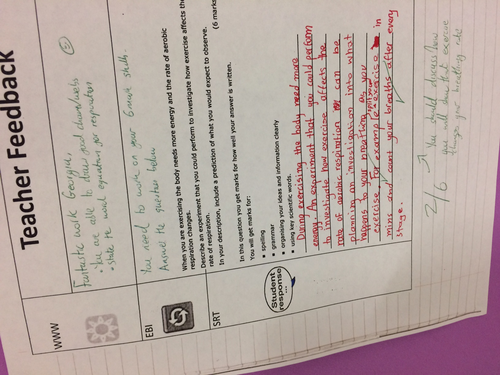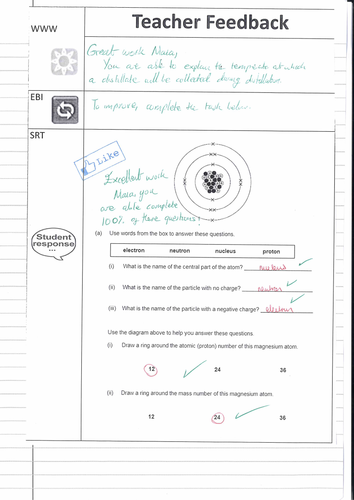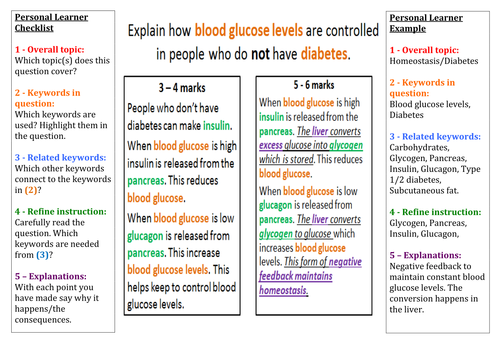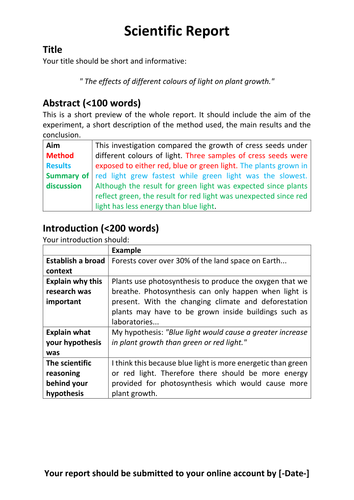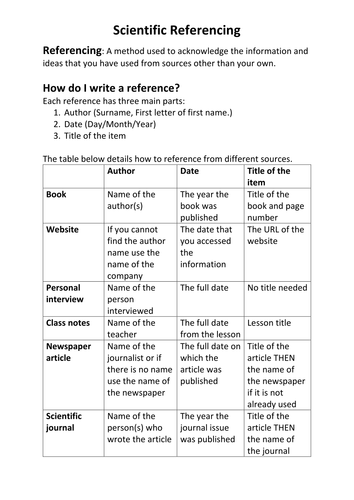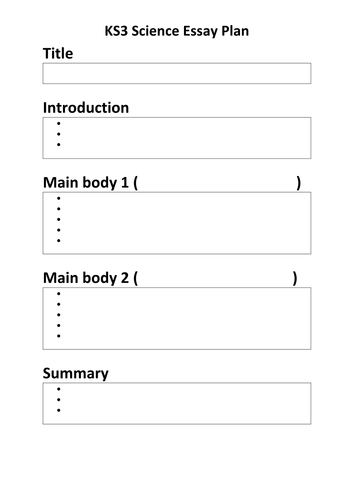243Uploads
112k+Views
55k+Downloads
All resources

KS4 Chemistry 1 Marking and Feedback Exam questions with Answers (Formative assessment)
I’ve uploaded an image of the finished product.
This should be used ideally as a formative assessment before the summative assessment.
The teacher (using your school’s designated colour) writes a WWW and relates the EBI to one of the tasks.
The student completes the task using their designated feedback pen.
The teacher follows up and marks the work with comments on how to improve.
Since each unit has four different questions of various abilities, you can also differentiate.
This pack is for Chemistry 1 and included 4 question sheet for these units:
C1 Atomic structure
C2 The periodic table
C3 Structure and bonding
C4 Chemical calculations
C5 Chemical changes
C6 Electrolysis
C7 Energy changes

Physical development – infancy & early childhood
New BTEC Tech Award Health and Social Care
Component 1
Learning Aim A1

C5.2 Displacement Reactions
AQA GCSE Sciences (9-1)
Chemistry: C5 Chemical changes
Lesson 2: C5.2 Displacement Reactions
Based on the Kerboodle Resources
The AQA Kerboodle worksheet are not included so as to be acting within the TES code of conduct.

KS4 Physics 1 Marking and Feedback Exam questions with Answers (Formative assessment)
I’ve uploaded an image of the finished product.
This should be used ideally as a formative assessment before the summative assessment.
The teacher (using your school’s designated colour) writes a WWW and relates the EBI to one of the tasks.
The student completes the task using their designated feedback pen.
The teacher follows up and marks the work with comments on how to improve.
Since each unit has four different questions of various abilities, you can also differentiate.
This pack is for Physics 1 and included 4 question sheet for these units:
P1 Conservation and dissipation of energy
P2 Energy transfer by heating
P3 Energy resources
P4 Electric circuits
P5 Electricity in the home
P6 Molecules and matter
P7 Radioactivity

KS4 Physics 2 Marking and Feedback Exam questions with Answers (Formative assessment)
I’ve uploaded an image of the finished product.
This should be used ideally as a formative assessment before the summative assessment.
The teacher (using your school’s designated colour) writes a WWW and relates the EBI to one of the tasks.
The student completes the task using their designated feedback pen.
The teacher follows up and marks the work with comments on how to improve.
Since each unit has four different questions of various abilities, you can also differentiate.
P8 Forces in balance
P9 Motion
P10 Force and motion
P12 Wave properties
P13 Electromagnetic waves
P15 Electromagnetism

P3.1 Energy Demands
AQA GCSE Sciences (9-1)
Physics: P3 Energy Resources
Lesson 1: P3.1 Energy Demands
Based on the Kerboodle Resources
The AQA Kerboodle worksheet are not included so as to be acting within the TES code of conduct.

P1.1 Changes in energy stores
AQA GCSE Sciences (9-1)
Physics: P1 Conservation and dissipation of energy
Lesson 1: P1.1 Changes in energy stores
Based on the Kerboodle Resources
The AQA Kerboodle worksheet are not included so as to be acting within the TES code of conduct.

C9.1 Hydrocarbons
AQA GCSE Sciences (9-1)
Chemistry: C9 Crude oil and fuels
Lesson 1: C9.1 Hydrocarbons
Based on the Kerboodle Resources
The AQA Kerboodle worksheet are not included so as to be acting within the TES code of conduct.

B18.2 Land and water pollution
AQA GCSE Sciences (9-1)
Biology: B18 Biodiversity and ecosystems
Lesson 2: B18.2 Land and water pollution
Based on the Kerboodle Resources
The AQA Kerboodle worksheet are not included so as to be acting within the TES code of conduct.
Keywords: Eutrophication, Indicator species

B18.1 The human population explosion
AQA GCSE Sciences (9-1)
Biology: B18 Biodiversity and ecosystems
Lesson 1: B18.1 The human population explosion
Based on the Kerboodle Resources
The AQA Kerboodle worksheet are not included so as to be acting within the TES code of conduct.
Keywords: Biodiversity

P4.4 Component characteristics
AQA GCSE Sciences (9-1)
Physics: P4 Electric circuits
Lesson 4: P4.4 Component characteristics
Based on the Kerboodle Resources
The AQA Kerboodle worksheet are not included so as to be acting within the TES code of conduct.

P5.1 Alternating current
AQA GCSE Sciences (9-1)
Physics: P5 Electricity at home
Lesson 1: P5.1 Alternating current
Based on the Kerboodle Resources
The AQA Kerboodle worksheet are not included so as to be acting within the TES code of conduct.

Guide to answering 6 mark questions in science
The resource models the difference between 5 and 6 mark answer.

J J Thomson & Plum Pudding Model
Learners will discover how JJ Thomson came up with his Plum Pudding Model and will also see how Millikan discovered the charge of the electron.

B8.3 How plants use glucose
AQA GCSE Sciences (9-1)
Biology: B8 Photosynthesis
Lesson 3: B8.3 How plants use glucose
Based on the Kerboodle Resources
The AQA Kerboodle worksheet are not included so as to be acting within the TES code of conduct.
Keywords: Lipids, Starch, Proteins

C12.3 Testing for gases
AQA GCSE Sciences (9-1)
Chemistry: C12 Chemical analysis
Lesson 3: C12.3 Testing for gases
Based on the Kerboodle Resources
The AQA Kerboodle worksheet are not included so as to be acting within the TES code of conduct.

C4.4 The yield of a chemical reaction
AQA GCSE Sciences (9-1)
Chemistry: C4 Chemical calculation
Lesson 4: C4.4 The yield of a chemical reaction
Based on the Kerboodle Resources
The AQA Kerboodle worksheet are not included so as to be acting within the TES code of conduct.

Scientific Report
Models how students should write out a scientific report:
*) Abstract
*) Introduction
*) Method
*) Results
*) Discussion

Scientific Referencing
This is probably most appropriate for A-Level and GCSE students but I have been pushing my top KS3 students to get used to this way of writing.
Shows how to reference: books, videos, websites etc..

KS3 Scientific Essay Plan
I found that a lot of my KS3 were simply copying and pasting information for homework.
This was designed to get them to have to think critically about the information they are including.
Ideally, they follow the plan and you give feedback which they use along with the plan to write the actual essay.

